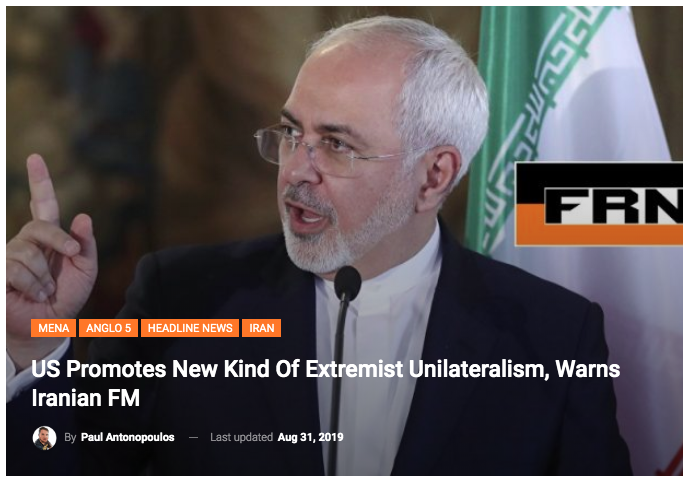Iran Asserts American Imperialism as Danger to World Community of Nations
US Promotes New Kind Of Extremist Unilateralism, Warns Iranian FM
By Paul Antonopoulos
Fort Russ
TEHRAN – Iranian Foreign Minister Mohammad Javad Zarif warned that unilateral US policy poses a serious threat to world politics and members of the international community.
When asked during an interview with the Chinese state news agency Xinhua if he agreed with the Chinese FM that the 2015 Joint Comprehensive Action Plan (JCPOA) is a competition between unilateralism and multilateralism, Zarif replied that Washington promotes a new kind of “violent unilateralism” .
“We believe the United States is driving a new kind of violent unilateralism, an extremist unilateralism, that destroys all bases of the global order,” said Iran’s top diplomat.
Zarif stressed that “the best countermeasure” against these “disturbing unilateral US tendencies” is the adoption of a multilateral approach, which implies “dialogue and work for the common good and common destiny”.
According to the Iranian diplomat, the current administration of US President Donald Trump “strongly believes in the use of coercive measures”, which is why Iran and China rightly called these US actions “economic terrorism”.
The Iranian foreign minister also commented on the US stance on the Hong Kong protests, criticizing Washington for intervening in Chinese internal affairs. He pointed out that the way out of the unrest in Hong Kong lies in dialogue and mutual understanding, according to PressTV, citing an interview by Xinhua.
Nuclear sanctions and agreement
The Iranian authorities have consistently pointed out that Tehran is not seeking war but the development of mutually beneficial cooperation with all countries.
In 2018, the US withdrew from the JCPOA, also known as the Iranian nuclear agreement , later reinstating sanctions against Tehran that target key sectors of the country’s economic system .
Reacting to the unilateral US withdrawal, Tehran announced that it would partially suspend its obligations under the agreement and abandon its nuclear commitments every 60 days until the remaining five signatories to the agreement (Germany, China, France, the United Kingdom and Russia) guarantee protection. of Iran’s interests.
